IN THIS ISSUE
- Letter from our Executive Director
- Issue Brief: Gender Equality Proves Indispensable to Global Development
- Organization Profile: Sustaining Movements, Securing Rights: CAMY Fund’s Decade of Empowering Feminist Youth – Led Change
- Goalmaker: Alice Lamunu – VOCFINU
- Member Blogs
- Welcome New Members
- GlobalWA Events
- GlobalWA Community Events
- Career Center
Letter from our Executive Director
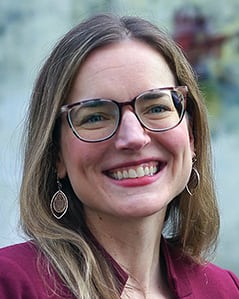
The world is not on track to achieve gender equality by 2030. In practical terms, what does this mean? According to the UN, if current trends continue, over 340 million women and girls will live in extreme poverty by 2030. At the current rate, it will take 300 years to end child marriage, 286 years to change discriminatory laws, and 140 years to achieve equal representation in workplace leadership.
On the flip side, it is estimated that closing the gender gap would expand the global economy by $7T USD. Education plays a key role in closing the gap. Studies show that educating girls leads to higher wages, improved health outcomes, and stronger economies. Additionally, countries with higher levels of gender equality experience lower rates of conflict and greater political stability.
In these rapidly shifting times for international development, I am inspired by the hard work and dedication of GlobalWA members. The Issue Brief below highlights how our member organizations are closing the gender gap with timely, strategic, and forward-thinking interventions.
Elizabeth Stokely
Interim Executive Director
Issue Brief
Gender Equality Proves Indispensable to Global Development
By Aneesh Chatterjee
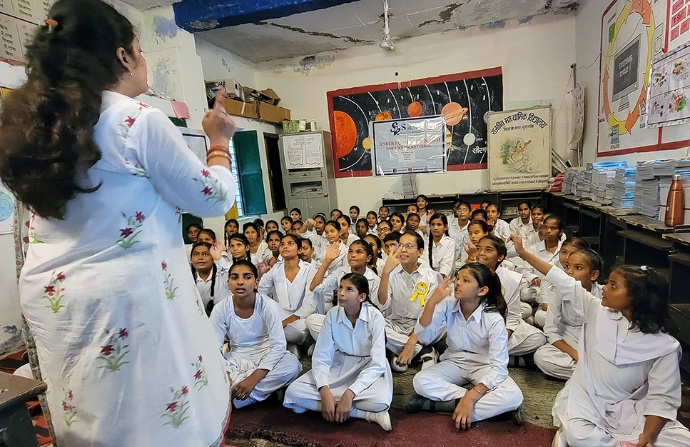
Sukarya-led Gender Equality for Adolescent Girls class, Gurugram, India. Photo: Joel Meyers
Sustainable Development Goal 5 stands as a cornerstone of global progress, championing gender equality and the empowerment of women and girls worldwide. Recognizing that gender equality is not only a fundamental human right, but a critical driver of peace, prosperity, and sustainability, the tenets of SDG 5 address the systemic barriers that hinder women and girls from fully participating in society.
These targets not only uplift individuals but also strengthen communities, economies, and nations, underscoring the reality that empowering women and girls is essential to building a more equitable and sustainable future for all. To that end, many of GlobalWA’s member organizations have deployed multi-sector support and philanthropic investment in programs that build a just and equitable future for women across the world.
MOBILIZING WEALTH FOR SUSTAINABLE GROWTH
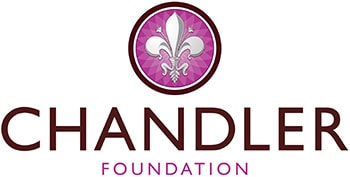
High-impact efforts by GlobalWA members have generated significant philanthropic investment in development initiatives that target SDG 5. The Chandler Foundation’s Equity Can’t Wait challenge ignited a dynamic philanthropic investment structure in gender equality programs. One of the central goals of the initiative was to move beyond investments spread across shorter time periods that made genuine change difficult. To generate high-impact philanthropic initiatives, the Equity Can’t Wait challenge brought philanthropists together to pool their grants, in addition to building a vetting system that narrowed down a vast applicant pool and brought curated proposals to the forefront for consideration.
By strengthening the legitimacy of proposals and growing the value of potential grants, philanthropists committed to being strong catalysts for change were connected with 150 vetted applicants, from a pool of over 500. The end result was a cumulative total of $40 million in grants, slated for six awardees: IGNITE, connecting women with training resources in political advocacy and policymaking; FreeForm, building multi-sector support frameworks for victims of domestic violence; Native Women Lead and New Mexico Community Capital, building resources and scaling capacities for Native women-owned businesses; Girls Inc., pushing career growth for young women through post-secondary education and entry-level careers; Ada Developers Academy, providing software development, programming, corporate social justice and management training to bring more women into high-income tech sector careers; and a team of 6 organizations transforming the caregiving industry. These projects, along with a collection of other finalists displayed in the Equity Can’t Wait Idea Lab, showcase the innovation and tangible impact through philanthropy led by the Chandler Foundation.

Philanthropic investments in gender-focused development programs also include the 2024 Origin Grant projects funded by the Starbucks Foundation, with a total of $4 million provided for initiatives across 7 countries. In Colombia, the Foundation’s grants help NGOs lead efforts to bring clean household water, awareness of WASH principles, and gender equity for women coffee farmers. Programs that promote personal growth and leadership for women entrepreneurs strengthen economic resilience and financial stability across Costa Rica, Guatemala and Cote d’Ivoire, while grant recipients in Uganda, Vietnam, Peru, and Indonesia access comprehensive tools for scaling coffee business production, financial resources, entrepreneurship training, and personal finance coaching.
Recipients of the Starbucks Foundation’s Origin Grant in 2024 include GlobalWA members CARE International and Mercy Corps, in addition to Bean Voyage, World Neighbors, Wakami Foundation, and Glasswing International.
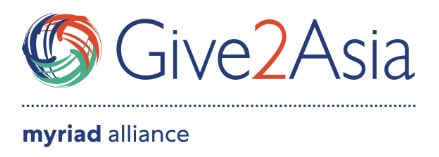
Another high-impact actor mobilizing funding for other organizations is Give2Asia, celebrating International Women’s Day in 2024 by underlining their commitment to empowerment and inclusion. To address gender inequality in STEM education fields, Give2Asia assisted the Hong Kong-based Women’s Foundation Limited with their Girls Go Tech training program. The initiative aims to provide in-demand coding and STEM-related skills to girls from secondary school levels, allowing them to break into STEM fields and access greater opportunities in tech sectors that may be traditionally male-dominant. The Girls Go Tech initiative builds a comprehensive learning environment for girls, with both online and in-person courses, workshops, career guidance, financial aid for post-secondary education, and access to inter-school competitive STEM-focused events. Since its launch in 2015, the program has helped over 3,400 girls break into STEM fields.
Give2Asia also helps mobilize funding for the Taiwan Sport Forward Association in their efforts to bring women’s baseball to major league sports in Taiwan, boosting visibility and engagement for the sport, providing necessary equipment and logistical support, and dismantling gender biases for women in male-dominated sports.
EMPOWERMENT THROUGH WEALTH, KNOWLEDGE AND LITERACY

The Gates Foundation implements multiple gender equality strategies for “identifying and dismantling the barriers that prevent women and girls from exercising bodily autonomy, planning for and starting healthy families, and being fully active in their homes, economies, and societies.” They believe when women can be in charge of their own health, money, and bodies, and have the opportunities to be effective leaders, everyone benefits.
Working primarily in sub-Saharan Africa and South Asia and through key partnerships, Gates has supported programs around economic empowerment, women’s health innovations, women in leadership, gender data and insights, digital connectivity for women and girls, and promoting positive gender norms.
One such partnership is with Adolescents 360 in Ethiopia on a program called Smart Start. Smart Start empowers adolescent girls to think critically about how many children they want and when to have them. The program was designed by adolescent girls for adolescent girls and helps girls think about the future they want, helps them set goals, and connects them with family planning tools to help them achieve those goals.
Gender Equality Toolbox: One resource that you can visit and learn from, the foundation’s Gender Equality Toolbox, provides tools that can guide foundation staff and partners in designing and managing gender-intentional and gender-transformative programs and investments and measuring the results and impact.
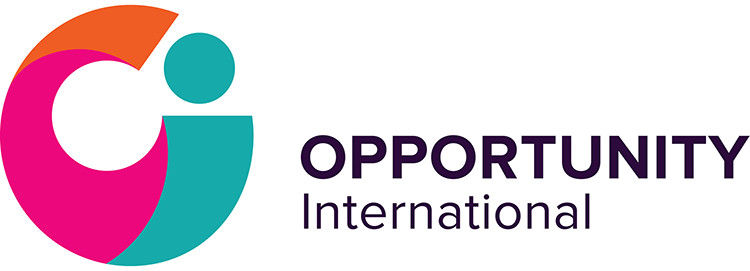
In Ghana, connecting women with financial resources is a critical priority for Ama Akuamoah, Director of Market Engagement for Opportunity International’s Digital Innovation Group. Her work in bridging the gap between the financial services available and the people that need them is vital for empowering local women to move away from poverty and access new pathways to stability and financial freedom. Ama was one of four women showcasing their transformative work in empowerment and stability for women – joining Bahati Zimba from Malawi, Sakshi Sodhi from India, and Alice Norah Lajwa from Uganda – as part of Opportunity International’s Unstoppable: Women of Opportunity Empowerment Series in 2024. Their work spans multiple sectors of innovation, from empowering women in agriculture to connecting underserved populations with financial services and education loans.
Opportunity International uses a multiprong approach spanning financial resources, microfinance, education, and agricultural finance in their efforts to address gender inequality in high-impact global sectors, according to their Fall 2023 Report. Their AgFinance program prioritizes gender-focused training for financial service partners operating across Africa, addressing gender norms in local communities and generating financial stability for women in agriculture through risk reduction and culturally sensitive policy updates. Opportunity also promotes awareness of subconscious gender bias in teaching and recruitment practices in schools, and access to capital for women in school administration across 15 countries. 97% of Opportunity’s microbanking clients are women.

In Bangladesh, Spreeha Foundation brings a multi-focus approach through their initiatives to ensure that underserved communities, including women, are given access to every basic resource they need to build a solid foundation. Spreeha drives gender equality through initiatives that empower women economically and socially, such as financial literacy, mentorship, and WASH training. Spreeha’s vocational training programs in tailoring, handicrafts, and digital literacy have enabled women to achieve financial independence, with mentorship programs building leadership skills. A business-focused lens that leverages locally valued skills underlines Spreeha’s commitment to supporting the unique cultural practices of their target communities in their efforts to address gender inequality.
EDUCATION AT THE CRUX
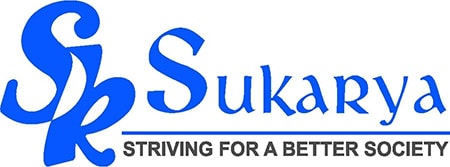
In India, Sukarya is working to address gender inequality parameters across socio-political, economic and healthcare sectors in Delhi and Gurugram. Their Gender Equity Programme has clear goals to provide young girls with education on sexual and reproductive health, reduce career roadblocks by inculcating digital skills, and promote the importance of WASH practices in their daily life across targeted communities, with a projected reach of 5,000 adolescents.

BuildOn is advancing gender equity by providing equal educational opportunities and empowering women through a spectrum of programs in Burkina Faso, Guatemala, Haiti, Malawi, Mali, Nepal, Nicaragua, and Senegal. In their school construction initiatives, they make sure that each partnering community commits to an equal distribution of girls and boys in school enrollment, challenging practices that devalue the necessity of education for women. buildOn’s Adult Literacy Program, which has recently expanded to Burkina Faso, offers adults the chance to learn reading, writing, and basic math skills. Notably, approximately 78% of participants in this program are women, highlighting its significant impact on women’s empowerment.
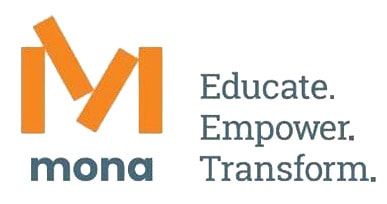
Exemplifying the importance of education is the Mona Foundation’s MAIA Impact School in Guatemala, part of their efforts to transform education and improve accessibility for women and girls across 15 countries. Established in 2017 near Sololá, Guatemala, the MAIA Impact School is Central America’s first Indigenous women-led secondary school and is dedicated to empowering young Maya women. In a country where fewer than 20% of Maya girls complete high school and 57% become mothers before the age of 18, MAIA addresses these challenges by offering a holistic education that emphasizes academics, cultural integrity, empowered identity, socio-emotional development, and family engagement. Serving approximately 300 girls from 40 remote villages, the school ensures students gain an average of two academic years of growth each school year. By equipping these young women with education and leadership skills, MAIA is actively working to reduce gender inequality and foster a more equitable society in Guatemala, a country with a large gender equity gap.

Education is also a tool to erode cultural roadblocks that have traditionally marginalized women, as demonstrated by the efforts of Sahar Education. Their Men as Partners in Change program engages aims to educate Afghan men and boys on topics such as fatherhood, caregiving, mental health, and women’s rights. By challenging traditional gender perceptions, the program fosters male allies who support women’s empowerment and contribute to healthier, more equitable communities through shared family responsibilities. Notably, over 70% of participants have shown significant improvements in understanding their roles as parents and the importance of equal leadership opportunities for both genders. This initiative underscores the critical role of involving men in efforts to reduce gender disparities and advance societal progress in Afghanistan.

In Ghana, Ashesi University demonstrates how gender equality can be integrated with education at scale. Their Gender Integration Policy emphasizes the inclusion of gender-sensitive perspectives across its curriculum, encouraging students to address gender-related issues within their communities. This approach not only fosters greater awareness but empowers students to enter advocacy and work toward reducing gender inequalities. Ashesi’s dedication to SDG 5 has even been globally recognized: the university was ranked first in Ghana and ninth in Africa in the 2020 Times Higher Education Impact Rankings, reflecting its significant contributions to sustainable development.
It is evident that education reform and targeted interventions in healthcare, career development and community-building are key drivers for reducing gender inequality. Through organized philanthropy, financial empowerment initiatives, and education-focused programs, GlobalWA members exemplify the transformative power of targeted action in advancing gender equality. As organizations continue to collaborate, innovate, and invest in gender-focused solutions, the path toward a more equitable and prosperous world grows ever clearer—one where women and girls everywhere can realize their full potential and contribute to a future defined by equality, opportunity, and progress for all.
The following GlobalWA members have submitted the short statements about their ongoing gender equality work.
buildOn is dedicated to advancing gender equity worldwide through its school construction and adult literacy programs. In many low-income communities, girls face significant barriers to education, including cultural expectations, early marriage, and household responsibilities. To break these cycles, buildOn partners with communities to construct schools where equal access for girls is prioritized. Before beginning construction community members sign a covenant that requires gender balance in student enrollment, ensuring that girls have the same educational opportunities as boys.
Beyond building schools, buildOn empowers women through its Adult Literacy Program, which provides educational opportunities to adults—primarily women—who were previously denied schooling. These programs teach literacy and numeracy skills while incorporating income-generating activities, enabling women to support their families and advocate for their rights. As women gain confidence and independence, they become role models for their daughters and community leaders who champion the importance of education for all.
Through these initiatives, buildOn is creating lasting change, challenging gender norms, and empowering women and girls to shape their own futures. By ensuring access to quality education, buildOn is not just building schools—it is building gender equity, one community at a time.
At Friends of WPC Nepal, we proudly celebrate our 25-year commitment to gender equality, showcased through our impactful initiatives that empower women and girls to reach their fullest potential within both Nepali and global communities. Our grassroots strategy emphasizes sustainable change through education, vocational training, and community empowerment programs. By partnering closely with local organizations and communities, we have developed effective programs that foster women’s financial independence while honoring their cultural heritage. Our dedicated efforts have positively transformed the lives of hundreds of women through comprehensive skills training, literacy programs, and micro-enterprise opportunities. We also emphasize supporting single mothers and women from marginalized communities, providing them with the tools, resources, and confidence needed to become leaders in their own right.
At Friends of WPC Nepal, we believe that genuine gender equality is realized when women are empowered across all aspects of life: economically, socially, and educationally. Our integrated approach enables us to create lasting positive changes within communities throughout Nepal, one woman at a time. The success stories we have witnessed illustrate that when women are given equal opportunities, entire communities thrive.
The Gender Equality Division funds some of the most effective advocates and programs working to advance women’s economic participation and decision-making power, increase women’s access to leadership roles, improve and protect women’s health and bodily autonomy, increase child survival and resilience, champion and expand positive social norms, and strengthen data and insights to address persistent gender inequalities.
Our strategy focuses on clearing obstacles that prevent women and girls in low- and middle-income countries in sub-Saharan Africa and South Asia from making their own choices and leading healthy lives with opportunity, dignity, and respect. We work with our partners to amplify the progress already being made and identify areas where the need is high and our support can make a difference.
Learn more about our strategy and commitment
Across Heifer International’s programs, women smallholder farmers are key drivers of climate resilience, food security and economic growth. When women have equal access to tools, financing and training, entire communities thrive. Alongside local partners, Heifer co-creates opportunities for women agri-entrepreneurs to strengthen household resilience to shocks, expand market access and boost rural development.
In Mexico, for example, the Milpa for Life project, funded by the John Deere Foundation and implemented by Heifer Mexico, trains farmers in Yucatán and Campeche on sustainable practices. The project also supports women in diversifying their production into complementary agricultural products, such as pigs, bees and chickens. As of October 2024, project participants have harvested over 770,000 cage-free eggs, earning a collective total of $100,000 from sales.
In Africa, the Tractors 4 Africa project, a collaboration between Heifer Nigeria and Hello Tractor, provides smallholders, many of them women, with access to machinery to increase farm productivity and household income. A tractor-sharing and pay-as-you-go financing component of the project lowers the barrier of entry, allowing women to procure tractors affordably with loan repayments calculated based on tractor’s monthly usage.
Despite ongoing challenges — climate change, conflict and slowed progress toward the SDGs —women continue to be agents of change in rural communities.
Fewer than 15 percent of women living in rural areas worldwide have secure land rights, depriving women of legal protection for their homes and livelihoods and leaving families, communities, and economies without the full benefits of women’s land stewardship and decision-making.
Landesa works to secure gender-equitable land rights for millions of people around the world—driving systemic change that breaks cycles of poverty and discrimination and elevates the status of women to participate in solutions for local and global challenges.
In West Bengal, India, Landesa partners with local organizations to support the government in empowering millions of women with the knowledge and legal documents to access and exercise their land rights. Landesa has also helped the government launch women-led facilitation centers to give rural communities low-cost services to update their land records while challenging discriminatory gender stereotypes about women and land.
In Liberia, Landesa is working with the national government and civil society organizations to ensure that implementation of the pivotal 2018 Land Rights Law realizes full land rights for women. Landesa supported the law’s development and currently works to ensure that women and other marginalized groups are included in the issuance of formal land deeds under the law.
With offices led by local teams across Asia and Africa, Landesa is working to equip millions of women with the legal rights to their land—affirming women’s fundamental rights to equality, security, and dignity and helping to create a more equal and prosperous world.
Throughout its 35-year history, Outright International has proudly identified as a feminist organization and advocated for the rights of lesbian, bisexual, transgender, intersex, and queer (LBTIQ) women through a variety of programs. We work closely with women’s rights activists at the United Nations and around the world because we believe our movements for gender equality and justice are inextricably linked. Outright was founded by queer women, co-hosted the first “lesbian tent” at the 1995 World Conference on Women in Beijing, and works closely with the Women’s Rights Caucus and LBTI Caucus at the UN Commission on the Status of Women and the NGO Working Group on Women, Peace and Security. We partner with grassroots LBQ activists in dozens of countries around the world to address and end gender-based violence and launched the LBQ Connect program in 2022 to support and amplify the work of LBQ activists in the Global South and East.
Pygmy Survival Alliance has a focus on providing education and jobs for women, which raises women’s social status and economic success, thereby promoting gender equality. We began by establishing a Village Council in Bwiza Village, with equal male and female representation, enhancing women’s social status and economic participation. That success led to our supporting women leadership in each new community where we work.
We have introduced vocational education programs for Batwa Pygmy communities, which have empowered women to become artisans and teachers. These include hairstyling, tailoring, basketmaking and soap making, as well as teacher training. Women learn leadership and business skills and may apply for small business grants to build their entrepreneurial ventures. New programs in raising rabbits have elevated the status of women farmers, while new training programs in shoemaking are creating skilled women shoemakers, a valuable craft in a country that prizes well-made shoes.
Furthermore, the Pygmy Survival Alliance has built a new early childhood educational center, providing jobs for women and supporting the welfare of mothers in the community. Increased women’s ability to provide for their families has a positive impact on gender equality. Notably, increased income boosted women’s social status more than was expected, and women’s entrepreneurship has improved village governance. Some women have even become landlords, further increasing their status.
Overall, the Pygmy Survival Alliance’s educational programs have a positive impact on gender equality in the communities they serve, promoting equal social status, access to education, and economic stability for both men and women.
At Sahar Education, gender equality is at the heart of our mission. In the face of ongoing gender apartheid, we provide Afghan women and girls with access to learning through innovative programs like Threads of Hope, Underground TechSheroes, and Secret Scholars Online. These initiatives empower women with literacy, digital skills, and economic independence while fostering resilience and self-advocacy.
Recognizing the importance of male allies, our Men as Partners in Change program engages young men in conversations about gender equality, breaking down barriers, and creating supportive communities for women and girls.
Despite restrictions, Sahar Education continues to plant seeds of change, offering hope and pathways to a brighter future where education is a right for all.
Empowered women are essential to creating a world without hunger. The Hunger Project is dedicated to addressing hunger’s root causes by dismantling systemic barriers that disproportionately affect women and girls, limiting their access to resources, rights, and decision-making power. Our mission is to mobilize individuals, especially women, as change agents, fostering sustainable, community-led solutions to transform these inequitable systems.
Globally, women constitute a significant portion of the undernourished population, underscoring the need to address gender inequality in hunger eradication efforts. Research indicates that equal access to resources for women can substantially increase agricultural productivity potentially lifting millions out of hunger.
In Africa, our Epicenter Strategy unites clusters of villages to create community centers that serve as hubs for sustainable development. This approach ensures equal representation of women and men in decision-making processes, promoting inclusive governance. In India, initiatives like the Strengthening Women’s Leadership in the Electoral Process (SWEEP) campaign enhance the capacities of elected women representatives, enabling them to effectively advocate for their communities. In Bangladesh, we train local leaders on gender issues, leading workshops and campaigns that address early marriage, dowry practices, malnutrition, and gender discrimination, and in Mexico, The Hunger Project works with local partners to strengthen women’s roles in agriculture and economic decision-making.
By activating women, our community partners unlock their potential and that of their entire communities to achieve self-reliance and prosperity, paving the way for sustainable, long-term development.
Special Olympics is committed to advancing gender equality by ensuring that indivdiuals of all abilities have opportunities to participate, compete, and thrive in sports. Across more than 190 countries, Special Olympics empowers female athletes with intellectual and developmental disabilities (IDD) by breaking down barriers to participation and providing opportunities to develop confidence, leadership skills, and a sense of belonging.
Founded by Eunice Kennedy Shriver, a trailblazer for inclusion, Special Olympics continues to build on her legacy by ensuring that women and girls around the world have equal opportunities in sports.
As Special Olympics Washington celebrates its 50th anniversary in 2025, we proudly bring this mission to life at the local level. By collaborating with communities, schools, and partners, we create environments where all athletes—regardless of gender—have the opportunity to reach their full potential. Representation matters. When women and girls with IDD see themselves in sports, they gain the confidence to dream bigger and achieve more. With a vision for even greater impact in our next 50 years, together, we are shaping a future where gender is never a barrier to opportunity.
Transforming Communities: Sukarya’s Gender Equality Initiative
India is ranked 129th out of 146 countries in the 2024 Global Gender Gap Index. highlighting persistent health, education, economic, and political inequalities. These challenges are even more severe in urban slums and rural villages, where adolescent girls lack access to essential knowledge on reproductive health, gender rights, and digital skills.
The Global Gender Gap Index (GGGI) measures gender disparities in economic participation, education, health, and political empowerment. In India, gender inequality persists across these areas, affecting women’s access to opportunities and resources.
Sukarya, a Gurugram-based NGO, is bridging this gap through its Gender Equality Programme. Since 2017, this initiative has empowered adolescent girls (10-19 years) in Delhi and Haryana by:
- Educating them on reproductive and sexual health, family life, and gender discrimination
- Providing digital literacy to prevent school dropouts and improve employability
- Raising awareness on Water, Sanitation & Hygiene (WASH) for better community health
From 2023 onwards, the program has reached 4,200 girls and 300 boys across 23 schools in 21 communities. By equipping young girls with knowledge and confidence, Sukarya enables them to challenge societal norms and become agents of change in their communities. They are trained to be the peers of other adolescents in their communities.
With a long-term vision, this program aims to empower 5,000+ adolescent girls, ensuring they transform their lives and mentor and uplift others—building a healthier, more gender-equitable society.
Women’s Link Worldwide is a Global South-led non-profit organization advancing women’s rights through legal action. We are legal experts, strategists, and activists dedicated to advancing justice and equality for women, girls, and gender-diverse people. Using legal strategies, we tackle barriers, challenge discrimination, and expand access to human rights in Latin America and The Caribbean, East Africa and Europe.
We use strategic litigation to bring long lasting changes in legal systems and we work with communities to bring about justice in ways most relevant to their reality. We join broader national, regional and global networks to advocate for change in legislation on sexual and reproductive health and rights, violence against women and girls, climate and environmental justice and racial justice.
Over the past two decades, Women’s Link has spearheaded landmark cases, from securing the release of hundreds of women unjustly imprisoned for “pregnancy-related crimes” in Rwanda, to decriminalizing access to abortion in Colombia, and securing increased protection for survivors of gender-based violence in Spain. Our work has empowered communities, reshaped policies, and redefined the possibilities of justice.
At Water.org, we understand that water is fundamental to achieving gender equity. Every day, women and girls spend 200 million hours collecting water—time that could be used for education, earning an income, or caring for their families. Without safe water and sanitation, they face greater risks of gender-based violence, lost economic opportunities, and preventable health challenges.
Through our work we are accelerating gender equity by expanding access to affordable financing for safe water and sanitation. To date, we have empowered more than 73 million people—90% of whom are women—with small, affordable loans that provide reliable and lasting access to safe water and sanitation solutions.
Among women who have accessed small loans through Water.org’s solutions, the impact is life-changing: 85% say accessing safe water is now easier, 71% feel less stress, and 88% report improved well-being.
An investment in water is an investment in women, unlocking improved health, safety, economic potential, and a more just and equitable world. Join us in building a future where every woman and girl can not only survive but thrive.
World Concern’s activities emphasize the inclusion and participation of women and girls across all sectors, including food security, education, clean water, economic empowerment, health, nutrition, and more. Fostering safe and inclusive practices is our top priority. To address patterns that exclude or marginalize women, we listen and learn from the experiences and perspectives of community members. We engage them in trainings that highlight the importance of women’s voices and involvement in fostering holistic, community development. Our staff collaborate with our project participants, including men, to identify unequal power relationships and resolve the barriers that inhibit safe and inclusive behaviors. We raise awareness about the risks and harms faced by women and girls, such as gender-based violence, early child marriage, and low retention and enrollment in school. Through collective action to counter the systemic barriers that perpetuate inequality, we work toward transforming communities and ensuring lasting change.
The goal of World Vision’s work is life in all its fullness for the world’s most vulnerable children. Ensuring gender equality is foundational to achieving that vision. Girls and women, boys and men must share equal enjoyment of human rights, of opportunities and resources if the outcomes of our work are to be the most impactful and sustainable.
In order to integrate gender equality across our programs, a network of technical specialists in World Vision offices across the world work alongside program staff and partners to ensure that the opinions, needs, experience and skills of girls and women, boys and men are heard, recognized and form the basis upon which we build our work – from women’s economic empowerment to addressing sexual violence; from ending female genital mutilation and child marriage, to health, water, sanitation and hygiene work; across our education and child protection programs – in development programs, humanitarian relief and advocacy efforts.
As World Vision president and CEO Edgar Sandoval Sr. says, “Creating environments for right relationships between girls and boys and women and men is a path to long-term, sustainable change that will help end extreme poverty.”
Organization Profile
Sustaining Movements, Securing Rights: CAMY Fund’s Decade of Empowering Feminist Youth – Led Change
By Amber Cortes
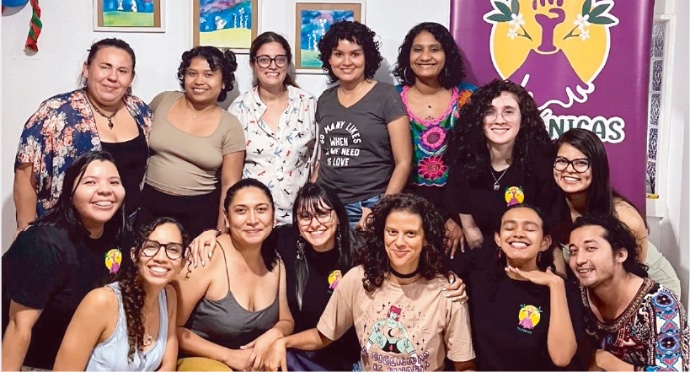
Anniversaries are a perfect time to reflect upon where you’ve been, and where you’re going.
After mobilizing more than $6 million in funding to support over 100 youth-led organizations across Central America and Mexico, the Central America Youth Fund (CAMY Fund), a program of the Seattle International Foundation (SIF), is celebrating their tenth anniversary—and looking ahead to what’s next.
“Though the coming fund for the next five years, we’re thinking a lot about what flexibility means for us,” says Melissa Zamora Monge, a feminist and human rights activist from Costa Rica who is the Program Officer for the CAMY fund.
These days, external shifts in politics, social challenges and evolving needs have highlighted the importance of remaining flexible in finance, plans and strategies.
“For SIF it is very crucial to stay attuned to that shifting context. Understand that rapid changes require modifying strategies to address emerging needs,” says Zamora Monge.
“And given the rapid changes right now in the social-political landscape, this means strengthening youth leaderships and institutional growth to ensure movements thrive beyond individual funding cycles.”
The CAMY fund focuses on empowering youth leaders in the areas of human rights, gender justice, and social transformation, providing flexible financial support, technical assistance, and close accompaniment to grassroots organizations in Central America.
CAMY’s focus on gender issues means supporting groups working to advance health, rights and leadership opportunities, prioritizing the work of women-led youth organizations promoting personal autonomy and dignity. And these groups certainly have their work cut out for them.
Young feminist activists and leaders in Central America are dealing with a lot: ideological opposition hindering progress in reproductive health services, and governments restricting access to essential care, putting individuals’ well-being at risk. In Central America, Honduras and El Salvador have the most restrictive laws regarding the right to decide.
“Youth feminist organizations in these countries face significant challenges,” says Zamora Monge.
Honduras is experiencing increasing concerns over democratic backsliding, while Nicaragua faces deepening authoritarianism and activists in El Salvador operate under increased surveillance and repression from the prolonged states of emergency.
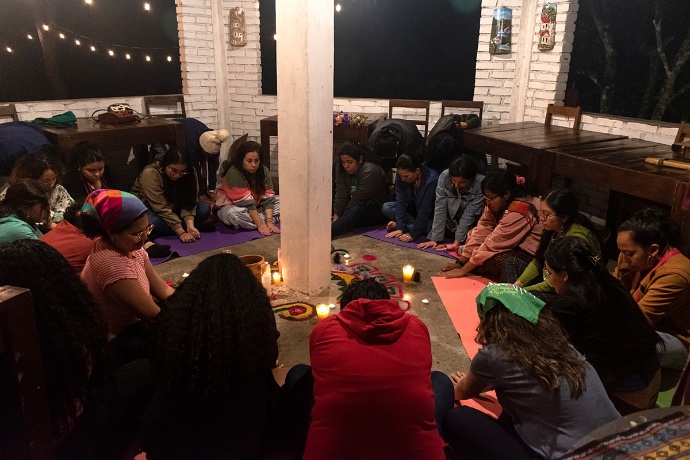
CAMY – Cuidado Colectivo. Photo: SIF
“It’s been almost three years now since they entered this state of emergency,” she adds. “As a result, they face ongoing safety concerns, including harassment and violence, requiring them to constantly be adapting their safety strategies.”
In this sense CAMY prioritizes autonomy, ensuring that grantees have the freedom to shape their initiatives based on their lived experiences and strategic priorities. They do this in part by using a flexible funding model that allocates resources where they are most needed, rather than being restricted to specific projects or activities, enabling organizations on the ground to respond quickly to emerging challenges, strengthen long-term sustainability, and maximize their impact.
Taking into consideration rapidly changing contexts, political instability, security issues or just the everyday struggles of life, CAMY fund recognizes that organizations may have to shift their priorities, timelines, plans and goals.
“The first thing is not imposing an agenda,” says Zamora Monge. “We’re not strict about it, like: ‘if you said you were going to do this, you absolutely have to do’.”
But there’s more to support than just funding. Knowing this, CAMY fosters sustainable activism by centering collective care and community well-being.
“We know that activists have lives,” says Zamora Monge. “They have to balance their time between their personal responsibilities, caregiving, studying and the significant physical, emotional and psychological effects of their work.”
“Their emotional and physical well-being are important. That is why we encourage them to incorporate it in their plans – along with activities that promote rest and collective care. Most of the funding they receive is restricted to specific activities, and they are often bogged down with a lot of paperwork and micromanagement.”
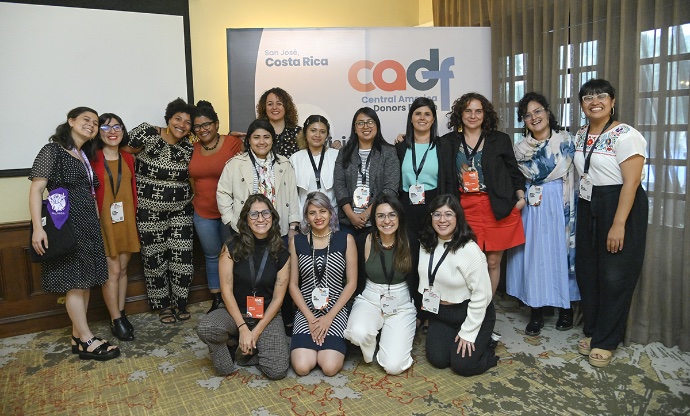
CAMY – CADF. Photo: SIF
Through six cycles of collective care programs, the CAMY fund has created safe spaces for healing, peer connection, and resilience-building, allowing activists to sustain their leadership despite ongoing political and social challenges. Since the initiative launched, the CAMY Fund helped more than 740 youth activists build mental health resilience.
This commitment to care and sustainability extends to the organizations CAMY supports, including those led by young activists navigating displacement and political repression, like Colectiva Volcánicas, a feminist organization led by young Nicaraguan migrant women in exile in Costa Rica. Formed in response to the political persecution and repression in Nicaragua since 2018, they create spaces for Nicaraguan women refugees and asylum seekers to advocate for their rights—particularly the right to live free from violence.
Their initiatives, such as the Migramos para Vivir campaign and the Furia Volcánica podcast, highlight their commitment to humanizing migration and amplifying their community’s voices.
With CAMY’s support, they have empowered migrant women by providing crucial information on asylum processes, legal protections, and strategies to combat violence.
Similarly, in El Salvador, CAMY-supported organization Comcavis Trans is working to ensure dignity, protection, and recognition for one of the country’s most marginalized communities: LGBTQI+ individuals, including people living with HIV. . . For over 15 years, they have been advocating for greater state support and protection for these communities through training and awareness efforts.
With the CAMY Fund’s support, they have expanded leadership training for activists, provided awareness workshops for public officials to ensure respectful treatment, and strengthened essential legal, psychological, and humanitarian services.
Other recent CAMY-supported initiatives have focused on advocating for the rights and freedoms of marginalized groups. In El Salvador, efforts have been made to support women’s legal defense and access to justice, while in Honduras there have been ongoing efforts to ensure that women’s health protections and access to necessary services are maintained. The CAMY Fund also contributed to a significant legal case that led to a landmark ruling by the Inter-American Court, mandating health protocols to ensure women’s well-being in critical situations.
Zamora Monge says these wins didn’t just happen overnight.
“The progress we see today is the result of years of hard work. They have been working nonstop for so many years, and for a long time, it felt like …nothing was happening.”
“I think it is important to highlight that these achievements were made possible through long-term partnerships, both within the region and globally, with various organizations and support networks working together, and CAMY is just one of them.”
The progress, she says, was a product of multiple public and social media campaigns, strategic litigation, communication with people in rural areas, and long-term alliances with different sectors that provided support nationally, and regionally.
But Zamora Monge warns that all this hard-earned progress can change in the blink of an eye, “because what is achieved today could be reversed tomorrow.”
For example, in El Salvador, there are ongoing concerns about the legal treatment of women experiencing obstetric emergencies. In Honduras, a lawsuit challenges policies that limit access to critical reproductive health care, which could affect recent progress made in advancing women’s rights.
Respecting the autonomy of grassroots organizations is essential to strengthening their existing capacities, particularly their ability to tell their own stories, says Zamora Monge.
“There’s going to be a lot of narratives that try to undermine their achievements, so I think it’s important to focus on the values that keep them united and organized.”
“In these challenging times, it’s crucial to uplift genuine voices that highlight the values of solidarity and collective action. I think it is important to talk more about that – about the values that bring them together, what keeps organizations and youth activists fighting, organizing and resisting.”
Goalmaker
Alice Lamunu – VOCFINU
Interviewed by Joel Meyers
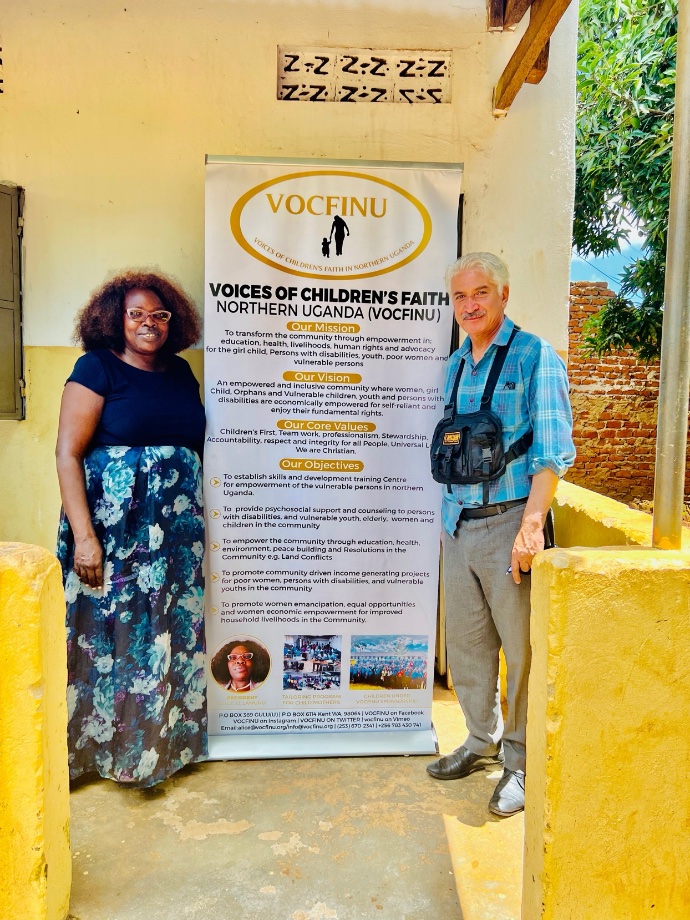
VOCFINU Executive Director Alice Lamunu with Dr. Foushanji in Uganda. Photo: VOCFINU
Voices of Children’s Faith in Northern Uganda, or VOCFINU, a GlobalWA member since 2020, is dedicated to uplifting Northern Uganda’s vulnerable populations, especially children, women, and adolescents affected by poverty and post-war hardships. Their holistic approach addresses the immediate needs of education, healthcare, and skills development to create pathways out of poverty and toward sustainable, empowered communities.
We had the opportunity to sit and talk with Alice Lamunu, founder and Executive Director VOCFINU, and discussed her roots, why she invested her own funds to start VOCFINU, why the education of women and girls’ matter, her early influencers, and more.
What is your role in VOCFINU?
I’m the founder and executive director of VOCFINU. VOCFINU stands for Voices of Children’s Faith in Northern Uganda. I’ve been responsible for initial funding, to get the organization of the ground. This could mean applying for grants or using our own personal assets to fund the initial organizational costs until the organization begins earning enough revenue to cover the cost. As founder and executive director, I oversee the relationship between the board members and the organization, and leading and managing the organization.
My work is very important to create a vision in order to provide unity within the organization. I must make sure coworkers understand the vision and are inspired by it.
The most significant part of my job includes outlining all the tasks that need to be fulfilled in the organization and referring back to the vision in order to help complete the task. What’s being fulfilled; what tasks are not being fulfilled? What new activities or tasks need to be redefined or changed to effectively engage the community?
My work is also invested in building relationships with both the outside community and with the population that VOCFINU is targeting. Promoting awareness of the organization to outside communities is essential in recruiting donors and volunteers in order to help assist the organization with poverty alleviation. We are trying to break [Ugandan] communities out of the cycle of poverty by the skilling of girls – to strengthen the economic wellness of the child mother.
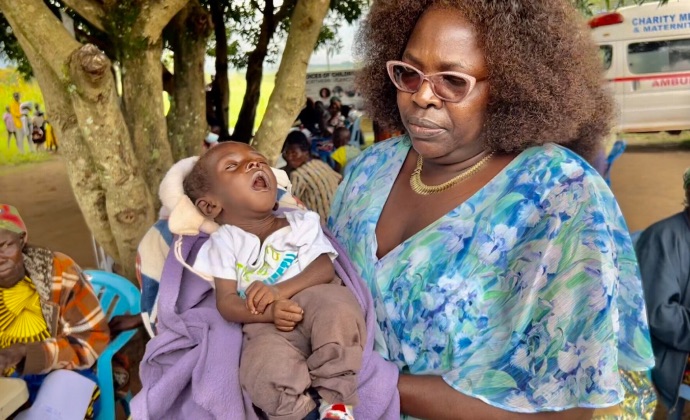
Alice Lamunu in Uganda medical camp; free treatment for vulnerable in rural communities. Photo: VOCFINU
What is the string of events that brought you to this (impactful) moment in your life – what are the motivators that cause you to do what you do?
Growing up in a rural community in northern Uganda, I witnessed firsthand the challenges faced by women and girls, including limited access to education, healthcare, and economic opportunities. My aunty, who is a widow and a strong and determined woman, inspired me to pursue my education and make a difference in my community.
These experiences deepened my understanding of the complexities of gender inequality and motivated me to dedicate my career to empowering women and girls. My motivators are the women and girls I meet every day who are struggling to overcome obstacles and achieve their dreams. Their resilience and determination inspire me to work harder and make a greater impact.
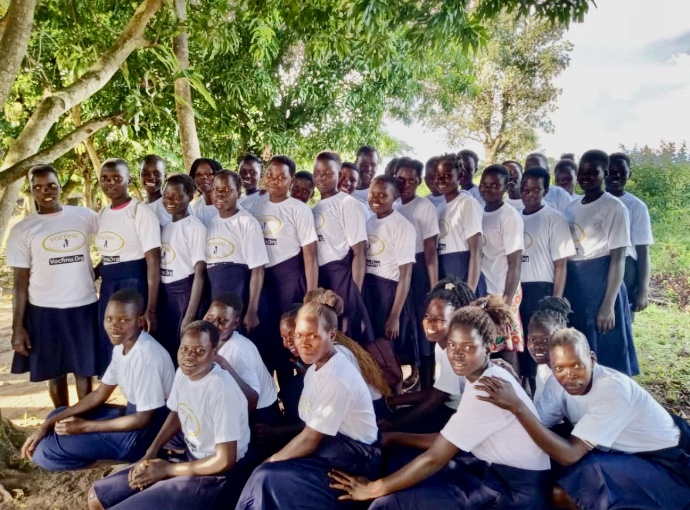
Girls in VOCFINU sponsored programs. Photo: VOCFINU
Who are your early influencers?
My early influencers include my mother and aunty, who taught me the importance of education and hard work, and my grandmother, who showed me the value of community and social responsibility. Additionally, I have been inspired by the work of organizations like the Global Fund for Women and the African Women’s Development Fund, which have demonstrated the power of investing in women and girls to drive social change.
Why do you focus on empowering girls and women in Uganda?
I focus on empowering girls and women in Uganda because they are disproportionately affected by poverty, inequality, and social injustice. In Uganda, women and girls face significant barriers to education, healthcare, and economic opportunities, which perpetuate cycles of poverty and limit their potential. By empowering girls and women, we can break these cycles and create a more just and equitable society. Uganda is also a country with a high population growth rate, and investing in girls and women is critical to ensuring the country’s future prosperity and stability.
What do you see as the biggest barriers to achieving gender equality?
In my experience, the biggest barriers to achieving gender equality include cultural and social norms that perpetuate discrimination and inequality, limited access to education and economic opportunities, and inadequate healthcare and social services. Additionally, the lack of representation and participation of women in decision-making positions and the prevalence of violence against women and girls are significant barriers to achieving gender equality.
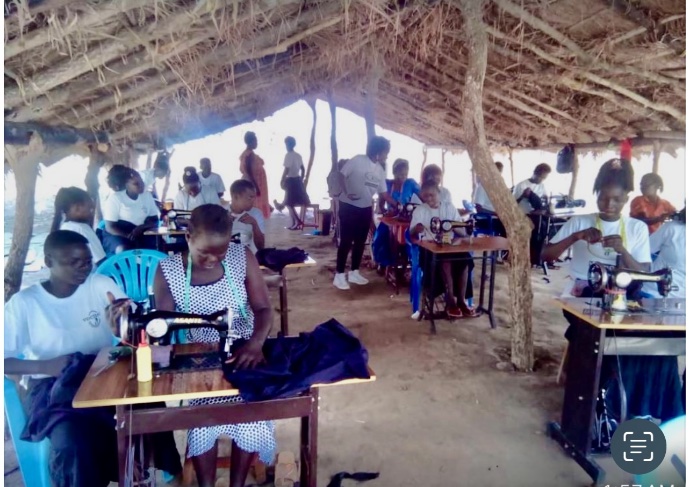
VOCFINU empowers child mothers , women and families who are In extreme poverty with skills training, they need for long-term personal and economic success to support their children and themselves. Photo: VOCFINU
I also see you work in King County – please describe this work.
While my primary focus is on empowering women and girls in Uganda, I also work with partners in King County to support refugee and immigrant women who have been affected by conflict and displacement. This work involves providing parental and childcare support, cultural orientation, language training, and job skills to help these women and their spouses integrate into their new communities and achieve economic self-sufficiency. I also collaborate with local organizations to advocate for policies and programs that support the needs of refugee and immigrant women and girls.
What are the biggest challenges facing you right now to meet your mission goals?
The biggest challenges facing me right now include securing sufficient funding to support our programs, navigating the complexities of working in a rural and resource-constrained environment in Uganda, and addressing the ongoing needs of women and girls in refugee settlements and host communities. Additionally, I face challenges in building and maintaining partnerships with local organizations and stakeholders, and in ensuring the long-term sustainability of our programs.
What do you consider to be your biggest accomplishment(s)?
Through our sponsorship program, we have offered quality education for vulnerable and disadvantaged girls, who have been caught in poverty in northern Uganda, enabling their educational completion/attainment at various levels including: primary school by over 350 girls, college diplomas
(talented girls and boys recently completed healthcare training in nursing and midwifery, and pharmacy), and the alleviation of poverty among 300 rural women through our livelihood programs. I am also proud of the psychosocial support and healthcare services we have provided to over 2000 community members affected by conflict and diseases.
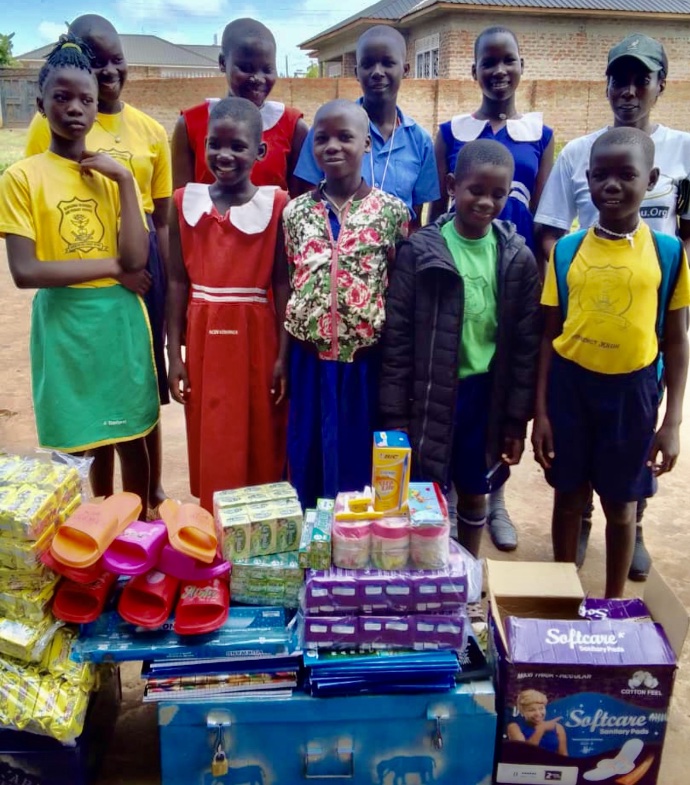
VOCFINU provides children with back to school supplies. Photo: VOCFINU
What do you strive to achieve with your efforts?
I hope to achieve a future where women and girls in Uganda have equal access to education, healthcare, and economic opportunities, and where they are able to live free from violence and discrimination. I envision a future where women and girls are empowered to make their own decisions and shape their own destinies, and where they are able to contribute fully to the development of their communities and country.
What’s next for you? What’s your vision for the near and far future?
What’s next for us is to continue to build on our successes and to address the challenges that we face. We are currently seeking funding and support to expand our programs and to increase our impact, including within the refugee settlements in northern Uganda. We are also looking to build new partnerships and to engage with new stakeholders who share our vision and our commitment to empowering girls and women in northern Uganda.
Member Blogs
buildOn From Barefoot Student to Inspiring Teacher: A Story of Educational Perseverance in Nicaragua
Sukarya Breaking Barriers: Advancing Gender Equality for a Fairer Future
Women’s Link Worldwide Defective Contraceptives: A Hidden Crisis of Racial Injustice in Global Healthcare
Landesa/Stand for Her Land In Uganda, a Collective Approach Delivers Transformative Change for Women, Families, and Communities
Elevate Destinations Five Painful Pitfalls to Avoid on Donor Trips
buildOn Gender Equity: A World Where We All Win.
World Concern Empowering Women & Transforming Communities in the Democratic Republic of Congo (DRC)
Sahar Education Defying Gender Apartheid: How Sahar Education Empowers Afghan Women – Global Washington
Heifer International Working With Women is Good Business – Global Washington
Welcome New Members
Please welcome our newest Global Washington members. Take a moment to familiarize yourself with their work and consider opportunities for support and collaboration!
AndHumanity
AndHumanity is an integrated inclusive marketing and communications agency with the core purpose of serving people-first brands. Since its origin, AndHumanity has partnered with brave, compassionate, and future thinking leaders across the globe, with notable clients like Arc’teryx, Henkel, TELUS, Telefilm Canada, ASML, and more. It was founded by siblings Matthew and Tammy Tsang – international award-winning marketers – who wanted to be seen in their work, and to stop perpetuating stereotypes and harm within the industry. They wanted to combine their love of marketing with their desire to ensure their children would see themselves represented in the media sphere. andhumanity.co
Friends of WPC Nepal
Friends of WPC Nepal is a fundraising organization that seeks to prevent human trafficking as well as protect and empower at-risk women and children in Nepal through awareness programs, education scholarships, job training, and the Safe home. friendsofwpcnepal.org
Milkah Kihunah Consulting
Dedicated Program Manager and Advocacy Specialist with 15+ years of experience designing and implementing initiatives to promote gender equality, social inclusion, and community-led development while driving policy change. Passionate about empowering women, young people, and vulnerable groups to access essential resources, including education, economic opportunities, health and social support. Milkah Kihunah | LinkedIn
myAgro
myAgro is a rapidly growing 501(c)(3) non-profit organization dedicated to empowering smallholder farmers in West Africa. myAgro offers a mobile layaway platform that allows farmers to save for agricultural inputs in small increments, and then deliver high-quality agricultural products and corresponding training to improve farmers’ yields. With its innovative model and commitment to sustainable agriculture, myAgro aims to reach and support one million smallholder farmers by 2027. MyAgro
Save the Children
Save the Children believes every child deserves a future. In United States and around the world, we do whatever it takes – every day and in times of crisis – so children can fulfill their rights to a healthy start in life, the opportunity to learn and protection from harm. With over 100 years of expertise, we are the world’s first and leading independent children’s organization – transforming lives and the future we share. savethechildren.org
University of Washington School of Law – Sustainable International Development Graduate Program
The UW Law Sustainable International Development (SID) Program trains lawyers to address interrelated global challenges and to advance law and policy frameworks that help people thrive within the ecological limits of our planet. law.uw.edu/academics/llm/sustainable-development
GlobalWA Events
February 26
Communications in Chaotic Times
March 5
International Women’s Day: Stories of Strength
April 4
Save the Date! Pangea Giving Member Gathering
Community Events
February 28
War in Ukraine: A Three-Year Struggle for Sovereignty and Freedom | World Affairs Council – 12:00 pm
AI for Good: How can AI help our food systems? | Gates Discovery Center – 5:00 pm
March 4
Out of Focus: Sudan’s Worsening Humanitarian Crisis and Civil War | World Affairs Council – 12:00 pm
March 5
International Women’s Day: Stories of Strength | Gates Discovery Center – 5:00 pm
March 7
Philanthropy Northwest Network Call – Implications for Philanthropy in the New Administration – 11:00 am
March 12
Posner Symposium 2025 – All day
Career Center
Administrative Assistant Supervisor (closes 2/19/2025) Jackson School of International Studies
Operations & Fundraising Intern Sahar Education
Director of Philanthropic Advising Seattle Foundation
Fellowship in Global Rights and Immigration Detention Global Rights Advocacy (GRA)
Director of Private Sector Partnerships The Max Foundation
Chief Executive Officer Health Care Without Harm (via GoodCitizen)
Chief Operating Officer Panorama Global
IRC Washington: Seeking Volunteers for Strategic Donor Engagement Committee International Rescue Committee
Communications and Advocacy Manager – Resilient Water Accelerator WaterAid
Climate & Water Manager – Resilient Water Accelerator WaterAid
Check out the GlobalWA Job Board for the latest openings.